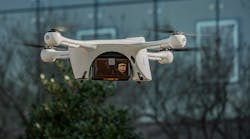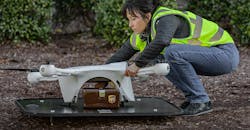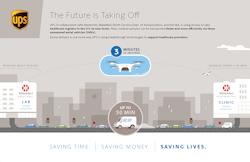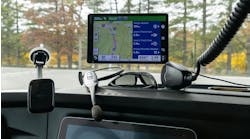UPS wants to grow its fleet of aircraft in a small way: More unmanned drones transporting medical samples, which the carrier has seen success in a pilot program for a North Carolina hospital this year.
UPS, in a federal filing this week, said that commercial drone delivery still has technical challenges to solve, which it hopes to figure out by expanding its testing. The company flew the first Federal Aviation Administration (FAA)-sanctioned commercial drone delivery earlier this year.
The company — noting it is "continually looking for ways to leverage technology" to benefit "its customers and the public" — is seeking exemption from FAA regulations to allow its UPS Flight Forward (UPS FF) division to expand, according to its application, published Aug. 22 in the Federal Register. In that filing, the largest for-hire carrier in North America shared more details on its unmanned drone delivery business plans.
Since March, UPS has been part of a pilot program that delivers medical samples via Matternet drones at WakeMed's flagship hospital and campus in Raleigh, NC. The Unmanned Aircraft System Integration Pilot Program is overseen by the FAA and North Carolina Department of Transportation.
UPS argues in its filing that granting the petition would allow the carrier “to continue its work and expand its ability to offer this potentially life-saving service to this hospital network and its patients in North Carolina and elsewhere in the U.S.”
Currently, UPS is transporting blood and medical samples from outlying facilities to the labs within the WakeMed hospital network. The drone system "replaces the inefficient and time-consuming ground courier service used currently with a much more efficient and timely unmanned aircraft service," according to the UPS petition. "This provides test results and diagnosis to doctors more rapidly, leading to more timely treatment, which in turn improves the patient's health and overall experience."
UPS Airlines currently operates a fleet of 250 aircraft, which the company says is one of the safest airlines in the world. With its aviation experience, "UPS FF is the next logical evolution for UPS," the petition reads.
In the current WakeMed program, a medical professional loads a secure drone container with a medical sample or specimen, such as a blood sample, at one of WakeMed’s nearby facilities. The drone flies along a predetermined flight path, monitored by a trained Remote Pilot-in-Command (RPIC), to a fixed landing pad at WakeMed’s main hospital and central pathology lab.
“Using drones to bring blood and other diagnostic specimens from medical facilities to central labs will improve transport efficiencies like never before," Chris Cassidy, UPS president of global health care, said in March. "And with fewer vehicles on the road, we’ll generate less environmental impact.”
WakeMed has traditionally used ground courier services to transport samples between a satellite facility and the main campus for testing. Because the courier travels on a "batch processing" schedule, it causes the lab to be overrun with samples when the courier arrives, leading to inefficiencies and delays of patients' diagnosis and treatment.
Using drones to transport the samples, UPS argues in its petition, is much more efficient and timely as batch processing is eliminated. With steady sample testing, patients are diagnosed and treated quicker.
The program uses Matternet’s M2 quadcopter, which is powered by a rechargeable lithium-ion battery. It can carry payloads up to five pounds over distances up to 12.5 miles. Flights are currently run five days a week, condition permitting.
UPS and Matternet are gathering data from the operation that is shared with North Carolina and the FAA to help create operating standards.
They also want to consider how drones can be applied to improve transport services at other hospitals and medical facilities across the U.S., which is part of UPS's filing this week to expand its drone usage.
“Drone transport will improve speed of deliveries at a lower cost, enhance access to care and create healthier communities,” Donald Gintzig, WakeMed president & CEO, said in March. “WakeMed is committed to innovation, and we believe drone technology has the potential to achieve transformational improvements in health and healthcare delivery.
UPS also noted that it is appropriate that North Carolina, the state that was "First in Flight, is at the center of the quest into the next evolution of aeronautics: expanding the use of unmanned aircraft.
Comments on UPS’ exemption petition are due by Sept. 11.






